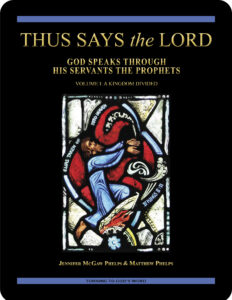 Thus Says the LORD: God Speaks
Thus Says the LORD: God Speaks
Through His Servants the Prophets
Volume I: A Kingdom Divided
Lesson 7 Elijah Triumphs over the Prophets of Baal
the First Book of the Kings 18:1—19:21
Revised Standard Version Catholic Edition (RSVCE)*
New American Bible Revised Edition (NABRE)*
Catechism of the Catholic Church
ex libris (in our library)
glossary for Thus Says the LORD—Volume I
cross references in Thus Says the LORD—Volume I
next lesson: Ahab Humbles Himself Before the LORD
This material coordinates with Lesson 7 on pages 45–50 in Thus Says the LORD: God Speaks Through His Servants the Prophets—Volume I: A Kingdom Divided.
“Behold, the days are coming, says the LORD, when I will make a new covenant with the house of Israel and the house of Judah, not like the covenant which I made with their fathers when I took them by the hand to bring them out of the land of Egypt, my covenant which they broke, and I showed myself their Master, says the LORD. But this is the covenant which I will make with the house of Israel after those days, says the LORD: I will put my law within them, and I will write it upon their hearts; and I will be their God, and they shall be my people. And no longer shall each man teach his neighbor and each his brother, saying, ‘Know the LORD,’ for they shall all know me, from the least of them to the greatest, says the LORD; for I will forgive their iniquity, and I will remember their sin no more.”—the Book of Jeremiah 31:31–34
welcome to Volume I of our in-depth study of the biblical prophets
We invite you to check out the sample first lesson and video from Volume I of this Turning to  God’s Word
God’s Word  two-part Catholic Bible study. Our online pages link to the free related lesson videos, a glossary, and cross references in the biblical text, and include maps, additional commentary, and prayers based on the primary Scripture in each lesson. Thus Says the LORD: God Speaks Through His Servants the Prophets—Volume I: A Kingdom Divided contains 28 lessons and has been granted an imprimatur. It may be purchased from our website shop. The companion 23-lesson Volume II: Restoration & Redemption also is available for purchase. If you have a Bible-study question or comment, click on the “ask us your question” or “what do you think” button on any study page.
two-part Catholic Bible study. Our online pages link to the free related lesson videos, a glossary, and cross references in the biblical text, and include maps, additional commentary, and prayers based on the primary Scripture in each lesson. Thus Says the LORD: God Speaks Through His Servants the Prophets—Volume I: A Kingdom Divided contains 28 lessons and has been granted an imprimatur. It may be purchased from our website shop. The companion 23-lesson Volume II: Restoration & Redemption also is available for purchase. If you have a Bible-study question or comment, click on the “ask us your question” or “what do you think” button on any study page.
open with prayer
It’s always wise to begin any Bible study with prayer, whether reading the Scriptures alone or meeting with others in a discussion study group. You can pray using your own words or use one of the opening prayers on our website. We especially like the following:
Lord Jesus, you promised to send your Holy Spirit
to teach us all things.
As we read and study your word today,
allow it to touch our hearts and change our lives. Amen.
let’s review—the First Book of the Kings 15:25—17:24
Lesson 6 Elijah & the Widow of Zarephath introduces one of the most significant prophets in the Old Testament. After much political turmoil in the northern kingdom, the prophet Elijah appears out of the blue announcing there’s to be a drought that will last until he says otherwise. Then Elijah is sent into hiding by the LORD, first east of the Jordan River and then north to Zarephath, an area ruled by the Sidonians. The effects of the drought spreads as far as Zarephath, where Elijah stays with a widow and her son. Although they’ve been on the verge of starvation, Elijah is unconcerned and miraculously provides an unending supply of food. During the time that Elijah is staying in Zarephath, the woman’s son becomes ill and dies, and the prophet restores him to life. In stopping the rain, providing unending food, and restoring life, Elijah demonstrates that he’s been given the power of God, something not as apparent in the prophets who preceded him—or in many of the prophets who follow him.
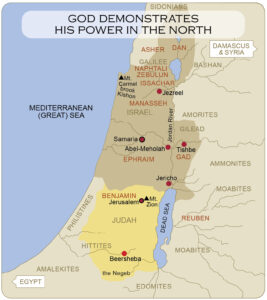 map notes—the brook Kishon & Mount Horeb
map notes—the brook Kishon & Mount Horeb
The biblical text for this lesson mentions Elijah being at a couple of places of significance. The brook Kishon in the First Book of the Kings 18:40 is the site where Elijah killed the prophets of Baal. It’s a small river that flows through the Jezreel Valley to the Mediterranean Sea. Many scholars believe that Mount Horeb, also sometimes called “the mountain of God,” and Mount Sinai are the same peak located in desert terrain on the Sinai Peninsula south of the kingdom of Judah. When Elijah fears for his life, he heads to Beer-Sheba, almost as far as he can get from the northern kingdom of Israel while remaining in the inhabited areas of Judah. From Beer-Sheba, the LORD instructs Elijah to travel 40 days to Mount Horeb, which is farther south outside of territory settled by the descendants of Jacob—and beyond the scope of the map for Lesson 1. Click on that map (above right) to enlarge it. The original map is on page 49 i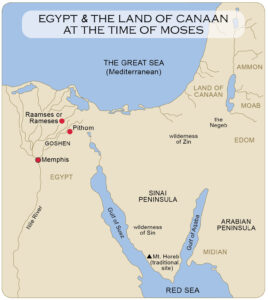 n Thus Says the LORD: God Speaks Through His Servants the Prophets—Volume I: A Kingdom Divided. Mount Horeb is significant as traditional the site where Moses encountered God at the burning bush and where he later received the Ten Commandments. There is much scholarly debate about the location of Mount Horeb; its traditional site on the Sinai
n Thus Says the LORD: God Speaks Through His Servants the Prophets—Volume I: A Kingdom Divided. Mount Horeb is significant as traditional the site where Moses encountered God at the burning bush and where he later received the Ten Commandments. There is much scholarly debate about the location of Mount Horeb; its traditional site on the Sinai  Peninsula can be seen on the map (left) that accompanies Lesson 1 The More the People Are Oppressed, the More They Multiply in the Turning to God’s Word Catholic Bible study You Shall Have No Other Gods: The Book of Exodus. Clicking on the map will enlarge it.
Peninsula can be seen on the map (left) that accompanies Lesson 1 The More the People Are Oppressed, the More They Multiply in the Turning to God’s Word Catholic Bible study You Shall Have No Other Gods: The Book of Exodus. Clicking on the map will enlarge it.
 Elijah & the Spirit of the LORD (53:56)
Elijah & the Spirit of the LORD (53:56)
In the eighteenth chapter in the First Book of the Kings, Elijah encounters Obadiah,  the overseer of Ahab’s household in the northern kingdom of Israel. Obadiah is described as a devout worshiper of the LORD who’s protected a hundred of the LORD’s prophets marked for death by Jezebel, the wife of Ahab, ruler of the northern kingdom of Israel. In the video for Lesson 7, Turning to God’s Word author Matthew Phelps points out that during the time that the 100 prophets were in hiding, it apparently never occurred to Ahab’s overseer that God might carry any of them to another place. Now, however, Obadiah is concerned that Elijah suddenly
the overseer of Ahab’s household in the northern kingdom of Israel. Obadiah is described as a devout worshiper of the LORD who’s protected a hundred of the LORD’s prophets marked for death by Jezebel, the wife of Ahab, ruler of the northern kingdom of Israel. In the video for Lesson 7, Turning to God’s Word author Matthew Phelps points out that during the time that the 100 prophets were in hiding, it apparently never occurred to Ahab’s overseer that God might carry any of them to another place. Now, however, Obadiah is concerned that Elijah suddenly  might be whisked away by the Spirit of the LORD. Obadiah recognizes that Elijah’s relationship with God is of a decidedly different nature than that of the 100 prophets whom Obadiah has been protecting.
might be whisked away by the Spirit of the LORD. Obadiah recognizes that Elijah’s relationship with God is of a decidedly different nature than that of the 100 prophets whom Obadiah has been protecting.
The Scripture ranges for the videos that accompany this Catholic Bible study match the ranges for the sets of questions in Thus Says the LORD: God Speaks Through His Servants the Prophets—Volume I: A Kingdom Divided. You can follow along with the video as Turning to God’s Word author Matthew Phelps discusses Lesson 7, “Elijah Triumphs Over the Prophets of Baal,” on pages 45–50 in the study book.
pray with the Psalms—don’t harm the LORD’s anointed
Those familiar with our Catholic Bible study The United Kingdom of Israel: Saul, David & Solomon Foreshadow Christ the King probably will recall David’s deference to Saul, even when Saul was trying to kill him. In the First Book of Samuel 26:9 and elsewhere,  David explains that he can’t harm Saul because Saul’s been anointed king by the prophet Samuel acting in place of God. David’s behavior, while noble, can seem moderately self-serving, since it’s to his own advantage to promote the idea that anyone anointed is what in the present day might be called “bullet-proof.” Fast-forward to the First and Second Books of the Kings, where very few kings are anointed. All legitimate prophets, however, are considered anointed when they first receive the word of God.
David explains that he can’t harm Saul because Saul’s been anointed king by the prophet Samuel acting in place of God. David’s behavior, while noble, can seem moderately self-serving, since it’s to his own advantage to promote the idea that anyone anointed is what in the present day might be called “bullet-proof.” Fast-forward to the First and Second Books of the Kings, where very few kings are anointed. All legitimate prophets, however, are considered anointed when they first receive the word of God.
Psalm 105:12–15 reinforces the idea that prophets receive special protection from God: “When they were few in number, of little account, and sojourners in it [the land of Canaan], wandering from  nation to nation, from one kingdom to another people, [God] allowed no one to oppress them; he rebuked kings on their account, saying, “Touch not my anointed ones, do my prophets no harm!” That passage can be interpreted as considering all of the descendants of Jacob as prophets. In the present day, all Christians—through the sacrament of Baptism—are considered to be anointed as priests, prophets, and kings. Prayed at Wednesday Vigils (Week I), Psalm 105 will be included as part of
nation to nation, from one kingdom to another people, [God] allowed no one to oppress them; he rebuked kings on their account, saying, “Touch not my anointed ones, do my prophets no harm!” That passage can be interpreted as considering all of the descendants of Jacob as prophets. In the present day, all Christians—through the sacrament of Baptism—are considered to be anointed as priests, prophets, and kings. Prayed at Wednesday Vigils (Week I), Psalm 105 will be included as part of  Lesson 7 The LORD Remembers His Holy Word in the Turning to God’s Word Catholic Bible study Sing a New Psalm: Communicating with God Through the Prayers of the Church—Volume II: Vigils, Day Prayer & Compline, which is scheduled for publication in late summer of 2025.
Lesson 7 The LORD Remembers His Holy Word in the Turning to God’s Word Catholic Bible study Sing a New Psalm: Communicating with God Through the Prayers of the Church—Volume II: Vigils, Day Prayer & Compline, which is scheduled for publication in late summer of 2025.
WHAT DO YOU THINK about Elijah’s challenge to the prophets of Baal & Asherah?
Baal and Asherah are closely connected as the most powerful of the Canaanite gods, and they’re considered the father and mother of the other pagan gods. Baal, a storm god, was believed to have control over the weather, while Asherah was a fertility goddess. Together, they were thought to hold power over harvests and animal fertility. The LORD, on the other hand, was viewed as a warrior god whose primary strength was in fighting to ensure military victories for his people. Once the descendants of Jacob had settled in the land of Canaan, farming replaced their previous nomadic lifestyle and they became attracted to the local gods believed to hold sway over agriculture.
 ? What’s the underlying message from the LORD in Elijah’s challenge to the prophets of Baal and Asherah?
? What’s the underlying message from the LORD in Elijah’s challenge to the prophets of Baal and Asherah?
? What might explain why Elijah stages his challenge before all the people of the northern kingdom of Israel instead of simply delivering God’s message to Ahab?
? What might most Christians consider to be God’s greatest strength?
? What false gods threaten worship of the LORD in the present day?
? What evidence can be seen that the Christian God is more powerful than current secular idols?
? Read the First Letter to the Corinthians 10:14–22, in which Paul discusses idols that threaten Christian worship in the early Church. What might have made these idols so attractive?
? What can a present-day Christian do to minimize the influence of false gods?
what point is God trying to make?
Two things that Elijah does during the power showdown with the prophets of Baal and Asherah emphasize the point that the LORD is trying to get across to his people through the actions and words of his prophet. Consider what God’s message is based on the symbolism of Elijah repairing the altar of the LORD before preparing the sacrifice, and on the title Elijah uses when he calls on the LORD to respond. If necessary, refer to the First Book of the Kings 18:30–32 and 18:36.
a foreshadowing of later prophecy
In the First Book of the Kings 18:37, the prophet Elijah announces the reason that he wants God to display greater power than the pagan gods: “Answer me, O LORD, answer me, that this people may know that thou, O LORD, are God, and that thou have turned their hearts back.” The last of the Old Testament prophets, writing just before the time of Jesus Christ, builds on the same theme in the Book of Malachi 4:5–6* when he delivers this message from the LORD: “Behold, I will send you Elijah the prophet before the great and awesome day of the LORD comes. And he will turn the hearts of the fathers to their children and the hearts of children to their fathers, lest I come and smite the land with a curse.” What about these two Old Testament passages could have caused many of the Pharisees during the time of Jesus to believe that John the Baptist might be Elijah?
Lesson 16 Malachi: The Final Prophetic Word in the Old Testament in the second volume of this  Turning to God’s Word Catholic Bible study, Thus Says the LORD: God Speaks Through His Servants the Prophets—Volume II: Restoration & Redemption, offers more information about the role that the prophet Malachi plays in salvation history. You can learn more about what led the people of Jesus’ time to think that
Turning to God’s Word Catholic Bible study, Thus Says the LORD: God Speaks Through His Servants the Prophets—Volume II: Restoration & Redemption, offers more information about the role that the prophet Malachi plays in salvation history. You can learn more about what led the people of Jesus’ time to think that  John the Baptist might be Elijah in Lesson 2 And This Is the Testimony of John in the Turning to God’s Word Catholic Bible study The Gospel According to John: An Encounter with Grace & Truth.
John the Baptist might be Elijah in Lesson 2 And This Is the Testimony of John in the Turning to God’s Word Catholic Bible study The Gospel According to John: An Encounter with Grace & Truth.
read the Catechism—fire as a religious symbol
In the First Book of the Kings 18:24, the LORD responds to Elijah’s prayer by sending fire. Paragraph 696 in the Catechism of the Catholic Church teaches that fire is one of the symbols of the Holy Spirit:
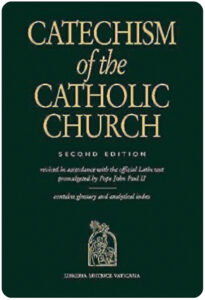 696 Fire. While water signifies birth and the fruitfulness of life given in the Holy Spirit, fire symbolizes the transforming energy of the Holy Spirit’s actions. The prayer of the prophet Elijah, who “arose like fire” and whose “word burned like a torch,” brought down fire from heaven on the sacrifice on Mount Carmel. This event was a “figure” of the fire of the Holy Spirit, who transforms what he touches. John the Baptist, who goes “before [the LORD] in the spirit and power of Elijah,” proclaims Christ as the one who “will baptize you with the Holy Spirit and with fire.” Jesus will say of the Spirit: “I came to cast fire upon the earth, and would that it were already kindled!” In the form of tongues “as of fire,” the Holy Spirit rests on the disciples on the morning of Pentecost and fills them with himself. The spiritual tradition has retained this symbolism of fire as one of the most expressive images of the Holy Spirit’s actions. “Do not quench the Spirit.”
696 Fire. While water signifies birth and the fruitfulness of life given in the Holy Spirit, fire symbolizes the transforming energy of the Holy Spirit’s actions. The prayer of the prophet Elijah, who “arose like fire” and whose “word burned like a torch,” brought down fire from heaven on the sacrifice on Mount Carmel. This event was a “figure” of the fire of the Holy Spirit, who transforms what he touches. John the Baptist, who goes “before [the LORD] in the spirit and power of Elijah,” proclaims Christ as the one who “will baptize you with the Holy Spirit and with fire.” Jesus will say of the Spirit: “I came to cast fire upon the earth, and would that it were already kindled!” In the form of tongues “as of fire,” the Holy Spirit rests on the disciples on the morning of Pentecost and fills them with himself. The spiritual tradition has retained this symbolism of fire as one of the most expressive images of the Holy Spirit’s actions. “Do not quench the Spirit.”
word of God—you could look it up in our archives
The nineteenth chapter in the First Book of the Kings stresses that the word of God can come to  people in different ways, and even can come to the same person in more than one way. Elijah’s encounter with the LORD on Mount Horeb is different in nature than any of his previous experiences. In Lost in Translation, an online column that can help readers connect with ideas expressed in the original languages of the Scriptures, Turning to God’s Word author Matthew Phelps examines two words used to indicate the “word of God.” New Lost in Translation entries are posted on Mondays, and past entries are archived on our website. Contact us if you’d like to receive Lost in Translation by email every week.
people in different ways, and even can come to the same person in more than one way. Elijah’s encounter with the LORD on Mount Horeb is different in nature than any of his previous experiences. In Lost in Translation, an online column that can help readers connect with ideas expressed in the original languages of the Scriptures, Turning to God’s Word author Matthew Phelps examines two words used to indicate the “word of God.” New Lost in Translation entries are posted on Mondays, and past entries are archived on our website. Contact us if you’d like to receive Lost in Translation by email every week.
WHAT DO YOU THINK about Elijah’s threefold assignment?
In the First Book of the Kings 19:15–16, the LORD sends Elijah away with a surprising assignment, telling the prophet: “Go, return on your way to the wilderness of Damascus; and when you arrive, you shall anoint Hazael to be king over Syria; and Jehu the son of Nimshi you shall anoint to be king over Israel; and Elisha the son of Shaphat of Abel-meholah you shall anoint to be prophet in your place.”
? Consider which of these three assignments to anoint others seems the most unusual?
? How do the kings to be anointed compare with the previously anointed kings in the southern kingdom of Judah?
 ? What might explain why there has been no further mention after Solomon of kings being anointed rulers over Judah?
? What might explain why there has been no further mention after Solomon of kings being anointed rulers over Judah?
? Scholars disagree about what’s going on when Elijah is asked to anoint his own successor. One possibility is that the LORD recognizes Elijah is exhausted from dealing with Ahab and Jezebel and so God plans to give his prophet some rest. What biblical details support this position?
? Another possibility is that Elijah is being replaced because he has somehow failed in his duties as a prophet. This is a viewpoint prevalent among some Jewish scholars. What Old Testament biblical evidence points to this possibility?
? What New Testament evidence suggests that this Jewish interpretation might be unsatisfactory for Christians?
? How does the way that Elijah generally is viewed in the Old Testament not square with the idea that Elijah has somehow failed as a prophet?
? What does the fact that only prophets are able to anoint kings suggest about how the role of the prophets is related to the role of the kings?
? How have prophets sent to speak for the LORD previously been anointed?
? Consider why Elijah is being sent to anoint his own successor.
what’s happening when & where
 Click on the timeline for Lesson 7 to expand it. It also appears on page 48 in the study book.
Click on the timeline for Lesson 7 to expand it. It also appears on page 48 in the study book.
tt he best Catholic commentary about Scripture
he best Catholic commentary about Scripture
To find out more about how Church teaching is supported by Scripture passages in Thus Says the LORD: God Speaks Through His Servants the Prophets—Volume I: A Kingdom Divided, check out the Index of Citations in the Catechism of the Catholic Church. Links (Revised Standard Version Catholic Edition [RSVCE*]) to the primary Scripture passages in the lesson and relevant paragraphs in the Catechism are provided here. Not every passage in the biblical text for this Catholic Bible study is referenced in a Catechism paragraph, however.
the First Book of the Kings 18:20–39—paragraph 2583
the First Book of the Kings 18:26–29—paragraph 2766
the First Book of the Kings 18:38–39—paragraph 696
the First Book of the Kings 18:39—paragraph 2582
the First Book of the Kings 19:1–14—paragraph 2583
the First Book of the Kings 19:5—paragraph 332
the First Book of the Kings 19:16—paragraph 436
ways our glossary might prove helpful
In addition to providing information about geographical locations, our glossary also points out  persons and places mentioned in the biblical text under multiple names or spellings. If you can remember a name but aren’t sure in which lesson it shows up, you can find it in the glossary, which lists every proper noun in the primary biblical text for Thus Says the LORD: God Speaks Through His Servants the Prophets—Volume I: A Kingdom Divided.
persons and places mentioned in the biblical text under multiple names or spellings. If you can remember a name but aren’t sure in which lesson it shows up, you can find it in the glossary, which lists every proper noun in the primary biblical text for Thus Says the LORD: God Speaks Through His Servants the Prophets—Volume I: A Kingdom Divided.
to learn more, read more Scripture
If you’re having difficulty with a particular passage of Scripture, it can be helpful to read the relevant  cross references—but looking these up can take time. To make that easier, we’ve compiled the cross references from the Revised Standard Version Second Catholic Edition (RSV2CE)—the translation that we reprint in our study books. That list can be found at the top of every online study page, and it includes links to cross references in the primary biblical text for Thus Says the LORD: God Speaks Through His Servants the Prophets—Volume I: A Kingdom Divided.
cross references—but looking these up can take time. To make that easier, we’ve compiled the cross references from the Revised Standard Version Second Catholic Edition (RSV2CE)—the translation that we reprint in our study books. That list can be found at the top of every online study page, and it includes links to cross references in the primary biblical text for Thus Says the LORD: God Speaks Through His Servants the Prophets—Volume I: A Kingdom Divided.
don’t forget about our indexes & extra online material

 If you’re trying to locate information about a specific Scripture passage, you can look it up in the index at the back of the study book or sample lesson. If you want to find a particular commentary, you can look up its title in the topics index. To learn more about another book of the Bible for which there’s a Turning to God’s Word study, visit the online study directories to read the commentaries and watch any accompanying videos. Finally, if you have a question or would like to make a comment about any of our studies, you can use one of the “ask us your question” or “what do you think” buttons to email our authors.
If you’re trying to locate information about a specific Scripture passage, you can look it up in the index at the back of the study book or sample lesson. If you want to find a particular commentary, you can look up its title in the topics index. To learn more about another book of the Bible for which there’s a Turning to God’s Word study, visit the online study directories to read the commentaries and watch any accompanying videos. Finally, if you have a question or would like to make a comment about any of our studies, you can use one of the “ask us your question” or “what do you think” buttons to email our authors.
ex libris—Church documents & books about religious topics
Link to magisterial documents referred to in our Bible studies at ex libris—magisterial documents.  This listing includes significant recent encyclicals as well as a number of historical Church documents. Recommended books related to Scripture study can be found at ex libris—main bookshelf
This listing includes significant recent encyclicals as well as a number of historical Church documents. Recommended books related to Scripture study can be found at ex libris—main bookshelf
wondering how to pronounce some of these words?
The following link is to a reading from the New International Version (NIV) Bible. To listen, open the link and click on the audio icon above the printed text. Although not taken from the translations used in our study materials, the NIV reading provides an audio guide to pronunciation of words in this lesson’s primary biblical texts. A close online version of the translation of the Bible used in Catholic liturgy in the United States as well as an audio guide for daily Mass readings for the current month can be found on the website of the United States Conference of Catholic Bishops (USCCB).
the First Book of the Kings 18:1—19:21 (NIV)
 close with Bible-based prayer related to this lesson
close with Bible-based prayer related to this lesson
Many of our Catholic study groups like to conclude their discussions with a prayer based on the scriptural focus of their lesson, and some participants include Scripture-specific prayer in their individual study. If you’re uncomfortable composing your own Bible-based prayers, you can follow our four easy steps. If you prefer, you can use the following prayer based on this lesson’s biblical text.
O God, you sent the prophet Elijah
to turn the people’s hearts back to you.
Strengthen us to turn away from all that prevents us
from worshiping your majesty in spirit and in truth.
We ask this in the name of your Son,
who endured his Passion, death, and Resurrection
in order that all men and women might have the opportunity
to turn to you in love and live. Amen.
Lesson 8 Ahab Humbles Himself Before the LORD—the First Book of the Kings 20:1—21:29
Lesson 6 Elijah & the Widow of Zarephath—the First Book of the Kings 15:25—17:24
you also may like our study of the book of Exodus
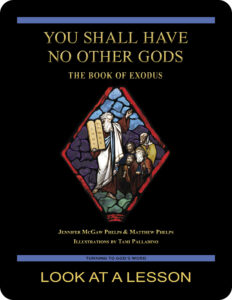 You Shall Have No Other Gods: The Book of Exodus, a 28-lesson Catholic Bible study with an imprimatur, provides an in-depth look at how significant events in biblical history that occurred thousands of years ago to descendants of Jacob remain relevant and even critical for present-day Christians to understand. The deliverance of the Hebrews from slavery in Egypt and the giving of Ten Commandments are examined along with the development of Moses’ relationship to God. Click on the book’s cover to view a sample lesson.
You Shall Have No Other Gods: The Book of Exodus, a 28-lesson Catholic Bible study with an imprimatur, provides an in-depth look at how significant events in biblical history that occurred thousands of years ago to descendants of Jacob remain relevant and even critical for present-day Christians to understand. The deliverance of the Hebrews from slavery in Egypt and the giving of Ten Commandments are examined along with the development of Moses’ relationship to God. Click on the book’s cover to view a sample lesson.
start a Turning to God’s Word Bible study
Thank you for your interest in Thus Says the LORD: God Speaks Through His Servants the Prophets— Volume I: A Kingdom Divided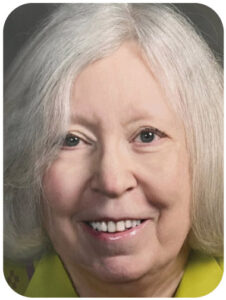 .
.  Information about beginning this or one of our other Turning to God’s Word Bible studies can be found at start a Bible study. Tami, Matthew, and I always are available to answer your Bible-study questions or concerns. Contact us if you’d like to start one of our studies or have your schedule listed with other TtGW study groups on our website. —Jennifer
Information about beginning this or one of our other Turning to God’s Word Bible studies can be found at start a Bible study. Tami, Matthew, and I always are available to answer your Bible-study questions or concerns. Contact us if you’d like to start one of our studies or have your schedule listed with other TtGW study groups on our website. —Jennifer
*There are seven deuterocanonical books in the Old Testament—the Books of Tobit, Judith, Wisdom, Sirach, Baruch, and First and Second Maccabees, as well as some passages in the Books of Esther and Daniel. Protestants usually refer to these works as “apocryphal,” a word that means “outside the (Protestant) canon” because they’re excluded from most Protestant Bibles. The word “deuterocanonical” means “second canon”; Catholics use that word to refer to any section of the Catholic Old Testament for which there are no extant, or existing, Hebrew manuscripts. All of the deuterocanonical books appear in the Septuagint, the earliest remaining versions of which date to the 1st century B.C. This Greek translation of the Old Testament was in common use by Jews at the time of Jesus—but the same books aren’t found in existing Hebrew manuscripts, which aren’t as old as the oldest version of the Septuagint. Learn more by reading How Do Catholic & Protestant Bibles Differ?
Turning to God’s Word printed Bible studies use the 2006 Revised Standard Version Second Catholic Edition (RSV2CE) translation for all Scripture references except those to the Psalms, which are taken from The Abbey Psalms and Canticles, prepared by the Benedictine monks of Conception Abbey and published in 2020 by the United States Conference of Catholic Bishops (USCCB). Scripture on the online study pages for Thus Says the LORD: God Speaks Through His Servants the Prophets—Volume I: A Kingdom Divided links to the 1966 Revised Standard Version Catholic Edition (RSVCE). The New International Version (NIV) audio recordings follow the same chapter and verse numbering as the RSV Catholic translations, but the NIV translation doesn’t include the deuterocanonical books and passages.
The 1966 RSVCE uses archaic pronouns and verb forms such as “thee,” “thou,” “didst” in the Psalms and in direct quotations attributed to God. The 2006 RSV2CE replaces those with more accessible English. A handful of significant translation changes in the RSV2CE include rendering almah as “virgin” in the Book of Isaiah 7:14 and restoring the term “begotten” in the Gospel According to John 3:16.
Numbering varies for some passages in this Bible study. Turning to God’s Word studies (print and digital) follow the numbering in the Revised Standard Version Catholic translations (RSV2CE and RSVCE). Discrepancies in the New American Bible Revised Edition (NABRE) are noted in the Index of Scripture Citations in the study book and the online sample.
 You can learn more about the Psalms by viewing a sample lesson from the Turning to God’s Word Catholic Bible study Sing a New Psalm: Communicating with God Through the Prayers of the Church—Volume I: Lauds & Vespers. The second part of that study, Sing a New Psalm: Communicating with God Through the Prayers of the Church—Volume II: Vigils, Day Prayer & Compline, is scheduled for publication in 2025. Some verse numbers may vary in different translations of the Psalms.
You can learn more about the Psalms by viewing a sample lesson from the Turning to God’s Word Catholic Bible study Sing a New Psalm: Communicating with God Through the Prayers of the Church—Volume I: Lauds & Vespers. The second part of that study, Sing a New Psalm: Communicating with God Through the Prayers of the Church—Volume II: Vigils, Day Prayer & Compline, is scheduled for publication in 2025. Some verse numbers may vary in different translations of the Psalms.
